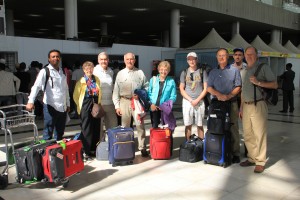
The group upon arriving at the Addis Ababa airport, posing with our tour guide, Yohannes.
When I accepted my CAPS fellow position as an intern with Water to Thrive (W2T) in Austin, I knew that a trip to Ethiopia would be a part of it. What I didn’t realize was how much I would learn about the country and how visible the impact would be that W2T has on rural communities there. Over the span of two weeks, our small group toured about 40% of the country and had the chance to visit twelve well sites sponsored by donors. W2T has been funding water projects in Ethiopia since it was founded in 2007 and in that time, numerous groups of donors from all around the country have had the chance to travel there. Our group of nine people included W2T’s founder, executive director, another intern, myself, and five other travelers.
The Church of St. George in Lalibella. It was the final of the eleven rock-hewn churches to be carved and is completely monolithic, meaning in one piece.
We traveled to six major Ethiopian cities, separate from the rural communities. In Addis Ababa, the capital, we saw the National Museum which among many national treasures, contained the skeletal remains of Lucy. In Lalibella, we saw the incredible rock-hewn orthodox churches, with each architectural aspect symbolizing something biblical. In Axum, we saw the ancient obelisks which serve as markers of tombs of royalty. Near Hawassa in the Omo Valley, we met members of the Mursi tribe, where the women are famous for using lip-plates. These were just a few of the historic and cultural places we visited. Our tour guide throughout the whole trip was fantastic and knew so much about the country.
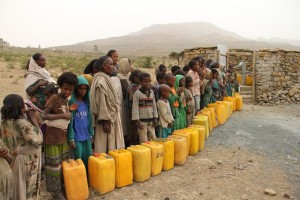
People of one rural community standing behind a line of “jerry cans” leading to a recently completed hand-dug well.
As amazing as it was to see and learn the history of the beautiful Ethiopia, it couldn’t compare to the opportunity to be with the twelve rural communities and celebrate the gift of clean water. Each of the wells we visited was recently completed or will be soon. And each one serves at least 200 people and often many more due to the need in the areas. At some of the most recently completed wells, we were greeted with popcorn, coffee, dancing, and shouts of celebration. But at each completed site, we heard how much of difference the clean and accessible water was having on the health and well-being of the people. Women no longer spent hours collecting water for their families and hurting their backs with the weight of the containers. Children, especially five and under, no longer fell ill or died due to water-borne diseases. The overall improved well-being of the community often brought more opportunities for education, women’s rights, and collaboration for further improvements. It was full of truly special moments as we celebrated with the communities on behalf of the contributions of so many.
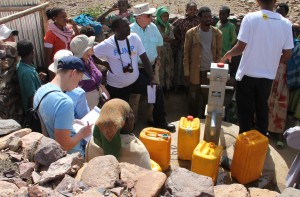
Taking notes as Weredekal, a representative of REST explains the details of a well and translates between us and the community members.
On an individual level, the trip has already impacted me both professionally and personally. Professionally, the experience provided a clear view of one way I can use my engineering degree and set me up to complete a difficult task this summer. We met just a few representatives from W2T’s hard working local partners REST and DAASC. Without these organizations and their intuitive and skilled leaders, none of the projects we saw could have been completed with the same results described in the section above. For me, it was really neat to see how these leaders, who each had technical backgrounds, had committed themselves to addressing the massive need of clean water supply in their country. I only hope I can commit myself in a similar way to a need and help generate results as visible and widespread. As I visited each well site, I took notes on the specific aspects of each project. This included site selection, well construction techniques, water committee organization, water source protection, as well as social and cultural concerns. These notes, in combination with research on water supply processes form the basis of the best practices document that another W2T intern and I will dedicate most of the summer to.
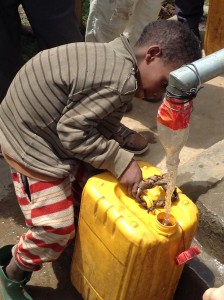
A boy trying very hard to collect every drop of water in a jerry can.
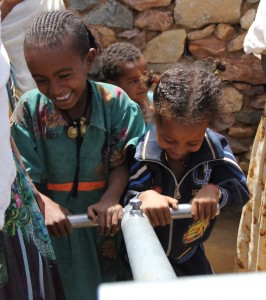
Two girls smiling as they pump water together.
Personally, the experience has greatly influenced my perspective. Before the trip, I heard something that has stuck with me since. It was along the lines of “All we can bring to a situation is our perspective.” I have thought a lot on that since. Ask anyone who’s traveled to a different country or spent time among those of a very different background, and I think this idea would resonate with them. I think there’s something special about sharing your perspective and hearing or seeing a very different one. For me, it does at least two things. It first reaffirms the many similarities that exist between people and then it enables me to see how my own perspective and role may fit into a larger context. The first concept was most clear to me as I talked with a woman who owned a small shop in the city of Axum. The woman was 22 years old, and had three adorable kids with her. She knew a little English and when I told her I was 21, she pointed out that “we are similar.” It was a neat moment because I realized that in spite of all of our differences, we were really more similar than different. The second concept is one that I think I’ll always be figuring out, one that will hopefully become clearer as I determine how I can serve and do my part in an organization.
I am so thankful for the opportunity to travel with W2T on this incredible trip to Ethiopia. I’m especially thankful for the role of the College of Engineering in helping cover the cost of the trip. It was an experience that will certainly continue to guide me in my life and professional decisions. I am excited to see how my time with Water to Thrive continues to challenge my thinking on how to best serve rural communities in Africa.
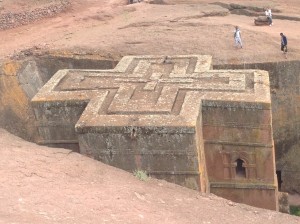
Hey Prof. Johnson,
I would love to share about Ethiopia and my experience with Water To Thrive. I’ll be home in mid August, so if you are available then, we can talk about it. Otherwise, I can stop by your office at the start of the semester. Thanks for the encouragement and offer to help! I’ll definitely email you if something comes up during the rest of my time here. I hope the rest of your summer goes well!
Hello Lars,
Wow, it is great to hear about the impact you are making and the experience you are gaining this summer. It would be great if you would be up for sharing your experience this summer with the CoE or more specifically the humanitarian engineering minors. Good luck with the rest of your internship. Let me know if I can help in any way!
Prof. Johnson
Craig,
Thank you for reaching out and letting me know about AWWA. I’ll definitely research the organization and its initiative Water for People. I also thank you for serving on the National Council. I’d really appreciate being able to talk with you around Homecoming time. My email is lars.anderson@valpo.edu. Please feel free to contact me anytime before then and I’ll look forward to meeting you in September.
Lars,
I have been a member of the COE National Council since 2002. Also have been a member of the American Water Works Association since the late 1990’s, and am a member of the Michigan Section. Worked in Product Development as an ME since I graduated in 1971. I thought you might be interested in AWWA, since most State Sections are affiliated with AWWA’s Water for People and support countries in a W2T type of effort. In Michigan, the Country supported is Equador. AWWA might be a nice follow-on tie-in that would interest you. Congratulations on your opportunity to serve through CAPS. I will be attending the Michigan Section Annual meeting in Sault Sainte Marie in mid-September this year, and also plan to attend the Homecoming National Council meeting. I would welcome the chance to talk with you at Homecoming if you are available.